“Do you believe in the devil Father?” These are just few of the questions and issues that the Netflix series DareDevil address. It has superb cinematography, brilliant acting and is an over all philosophically stimulating series!
I invited my film critic cousin Sammer Sweis to join me in the review of this intoxicating new show!
It is inspirational to see a hero that address questions of faith with a remarkable honesty and frankness rarely seen and mostly mocked as outdated by our secular world. It is uncommonly authentic and reverential—touching the core of the wound people of faith must hold as they live in the physical and spiritual reality of the world with its beauty and terror.
In the past few years we’ve seen a resurgence of superhero films-not that they ever went away-but this latest slew of comic book based blockbusters seems to have captivated audiences in ways that past films of this sort have not. And that appears due mainly to one strong element: the dark, tortured hero, or as some refer to it, the anti-hero (although not at all like Deadpool!). But this interest we believe is also from the cultural shift from relativistic postmodern worldview to a moralistic pluralistic one.
The tortured hero theme has now been transferred over as well to the small screen with the gritty series adaptation of DAREDEVIL. 
Here’s a show that realizes early on that first and foremost, to give us an antagonist we can easily relate to; Matthew Murdock (Charlie Cox):a kind, young boy living in the seedy, section of New York known as Hell’s Kitchen, who after a freak accident saving an older person from death, gets toxic waste splashed on his eyes and loses his sight at 9 years old.
This touches on the theme of sacrificial love –where the hero loses so much but in return gains much more. This is what philosophers call the paradox principle: You give to get, you die to really live.
However, it has the effect of intensely heightening all his other senses beyond normal human limits. He has an unnerving ability to decipher sounds as they bounces off a brick walls or feeling the vibrations in the tarmac and even heart beats of those around him –discerning if they are lying—not bad for a lawyer but enviable for fighting those hiding in the dark—except maybe assassin ninjas who slow their heart rates!
His reflexes are lightning fast, and he has trained hard following his father’s example in the ring. So although he does not have the money of Tony Stark and Bruce Wayne or the invulnerability and heat laser eyes of Superman, nor the hammer or confidence of Thor or the purity of heart of Captain America, he does have a human element that we all struggle with– doing good and losing so much when the cost is so high.
Now, when Matthew’s widowed father, a two bit boxer who’s in deep with the mob, is killed after refusing to throw a fight, Matthew dedicates himself in honing his powerful senses and uses them to fight the evil in his world, from confronting a child abuser who he hears with his acute hearing molesting his daughter next door to the taking down the criminal underworld of corrupt police, ruthless Russian mobsters and Japanese Yakuza, as a mysterious nighttime vigilante.
All this is established through brilliant flashback sequences but the main focus is the present day story-line of Matthew, who has now become a sharp, young lawyer attempting to start a fledgling law firm with his lifelong pal and comic relief friend Foggy Nelson (Elden Henson)–who he struggles to tell of his secret life.
All of the major crimes taking place in Hell’s Kitchen lead back to a shadowy crime kingpin named Wilson Fisk. Matt quickly takes upon himself to try unravel this mystery as well as bring down Fisk and everyone he’s involved with…all while trying to maintain his daytime alter ego of a vulnerable…and very blind, low rent, attorney and struggling with making difficult decisions.
Its this story thread-Matthew’s conflicted duality comes out, that gives the show its intense dramatic punch. Matthew has a moral code-he will not kill-but he’s dealing with criminals that are so vile and morally corrupt that most of the time he’s pushed to his limit–beating them to within an inch of their lives but never crossing the line, even though at times he feel he wants to!
However theologically speaking he may have already killed them in his heart. This leads him to God.
It’s not long before he finds his code especially put to the test when finally confronting the Kingpin himself. The screenwriters understand that while a show like this needs to be exciting, slick and fast paced, which it most certainly is, it also needs also to be grounded in reality–a human approach that gives us something to ponder and discuss later with each episode. All the action scenes are first rate-the kinetic and brutal fight sequences in particular with Matthew kicking butt are so well choreographed they rank among some of the best Foreign Martial Arts pictures of recent years reminding us of the old Bruce Lee films.
See this link for the preview of season 1
A wonderful resource to consider is Superheroes and Philosophy, edited by Tom and Matt Morris. 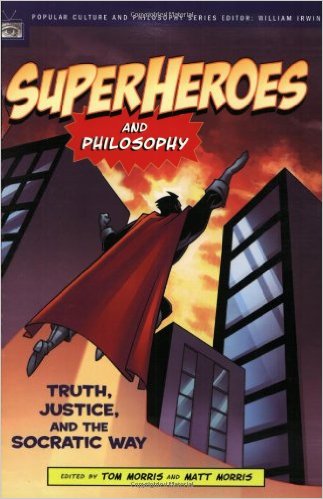
Daredevil is without a doubt a very bloody and violent show – definitely not for young kids, but even the carnage here seems meant to serve the plot when necessary and it is not just violence for the sake of violence; conveying a world of desperation and horror and more importantly, what Matthew and the other people are up against every day.
With the progression of each episode in this first season we get more detail and background of these other characters, both good and bad; and how the line between them is blurred. Remind you of the real world?
The most bold and intriguing is that of lead villain Wilson Fisk, played with quiet intensity and acted exceptionally by Vincent D’onfrio.
He is just as disturbed as Matthew with a terrible childhood, but he does not do what Matthew does, seek God. He chose to join the evil of the world to make it better. Ironic? Such is the power of sin to blind our hearts and the eyes.
At first he’s introduced as a hulking, remorseless monster with a short fuse that would rip the head off a 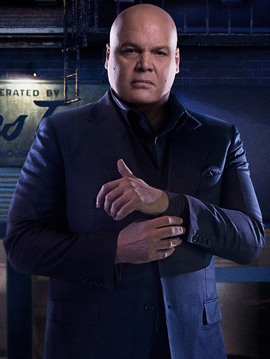 man with a car door–but before long we get glimpses of a broken boy within him who embraces the “any means necessary” theory–believing he’s doing the right thing for his beloved city.
man with a car door–but before long we get glimpses of a broken boy within him who embraces the “any means necessary” theory–believing he’s doing the right thing for his beloved city.
This leads us to consider, does anything become justified if it is done for “right motives? Immanuel Kant would turn in his grave over how Fisk is trying to justify his actions!
We even get flash backs of him as a child suffering under a very abusive and totalitarian wife-beating father who he…well you will have to see it for what Fisks does to his father that forever alters his life.
God gives him a second chance for redemption when he finds himself falling in love with lovely, kind beautiful, woman Vanessa, played well by the Israeli actress Ayelet Zurer. However after Vanessa is poisoned, Fisk sits by her hospital bed and says:
“So I can’t pray for you. All I can do is make a promise, one that not even god can prevent me from keeping—the people that did this to you, they will suffer.”
And later he compares himself to the ancient story told by Jesus, of the Good Samaritan but what character does he relate to in the story?
“I always thought I was the Samaritan in that story. I’m not. I’m not the priest, or the Levite, or the Samaritan. I am the ill intent that set upon the traveler when he was on a road that he should not have been on.”
The series refuses to turn Fisk into a one dimensional villain all the way through; he is a stark contrast of Matthew Murdock. The theme of vigilantism -and how far a person is willing to go for justice- is what audiences-including us- seem to be responding to with this series and other comic book tv/ movie adaptations. This issue is taken up more deeply and proudly in the second session with the appearance of the Punisher!
<<Why do we read or watch horror based shows like this? What is so attractive about these shows ? I wrote a psychological analysis of this which you can find here.>>
We all desire to see justice done, even if it is by a tormented soul in a farfetched MARVEL world pounding down justice on heartless criminals who are above the law, and sitting back to see the consequences this brings to both. We see Matthew bloody and beaten, broken and tortured both in body, which a night nurse, Rosario Dawson, mends and a broken and arduous heart whom his friend and priest Father Lantom helps to lead toward God.
In two of the most memorable scenes, Matthew seeks wisdom from Father Lantom and the conversations turns to the philosophical:
Matt Murdock: Bless me, Father, for I have sinned. It’s been a week since my last…
Father Everett: What the hell are you playing at, Matt? You didn’t come here for forgiveness. You came for permission, and I can’t give you that.
Matt Murdock: Justice isn’t a sin, Father.
Father Everett: No, but vengeance is. You see it every day on the street: violence begets more violence. Is that how you want to live your life? A lawyer during the day, and then judge and jury at night? Is that what you want?
Matt Murdock: Somebody has to do something.
Father Everett: But why you?
In another dialogue in Season 1, episode 9 “Daredevil: Speak of the Devil
Matt Murdock: Do you believe in the Devil, Father?
Father Lantom: You mean… as a concept?
Matt Murdock: No. Do you believe he exists? In this world, among us.
Father Lantom: You want the short answer or the long one?
Matt Murdock: Just the truth.
Father Lantom: When I was in seminary, I was more studious than pious, more… skeptical than most of my peers. I had this notion, which I was more than willing to speak about, at length, to whoever I could corner. That the Devil… was inconsequential. Minor figure in the grand scheme.
Matt Murdock: Not very Catholic of you.
Father Lantom: Uh-huh, yeah. In my defense, in the scriptures, the Hebrew word “Satan” actually means “adversary.” It’s applied to any antagonist. Angels and humans, serpents and kings. Medieval theologians reinterpreted those passages to be about a single monstrous enemy. And, in my youthful zeal, I was certain I knew why: propaganda. Played up to drive people into the church.
Matt Murdock: So you don’t believe he exists.
Father Lantom: Am I done talking?
Matt Murdock: Sorry
[Motions for him to continue]
Father Lantom: Years later, I was in Rwanda, trying to help local churches provide aid and sanctuary to refugees. I’d become close with the village elder, Gahiji. He and his family had the respect of everybody, Hutu and Tutsi alike. He’d helped them all; through famines, disease. The militia liked to force Hutu villagers to murder their neighbors… with machetes. But nobody would raise a hand against Gahiji. They said, “Well… how can we kill such a holy man?”. So the militia commander sent soldiers… with orders to cut his head off… in front of the entire village. Gahiji didn’t try to put up a fight. Just asked for the chance to say goodbye to his family. By the time he was done, even the soldiers didn’t wanna kill him. So they went to their commander and asked permission to shoot him. At least give him a quick death. The commander wanted to meet this man who had won the respect of so many. He went to Gahiji… talked with him in his hut, for many hours. Then he dragged him out in front of his village and hacked him to pieces… along with his entire family. In that man who took Gahiji’s life… I saw the Devil. So yes, Matthew… I believe he walks among us; taking many forms.
<<See my post on absolute evil here and to read about whether Satan/Devil is real, read this and this>
Matt Murdock: I know my soul is damned if I take his life. But if I stand idle, if I, if I let him consume this city, all the people that will suffer and die…
Father Lantom: There is a wide gulf between inaction and murder, Matthew. Another man’s evil does not make you good. Men have used the atrocities of their enemies to justify their own throughout history. So the question you have to ask yourself is: are you struggling with the fact that you don’t wanna kill this man, but have to? Or that you don’t have to kill him, but want to?
If a blind and broke man can take the abilities and gifts given him and still try to do the right thing even when it cost him so much, can we do any less? Was it Einstein who said
“The world is a dangerous place to live, not because of the people who are evil, but because of the people who don’t do anything about it.”
By the way season two is just as good!!
What do you think?

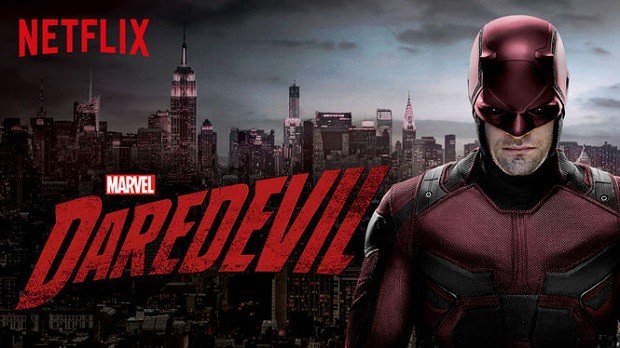

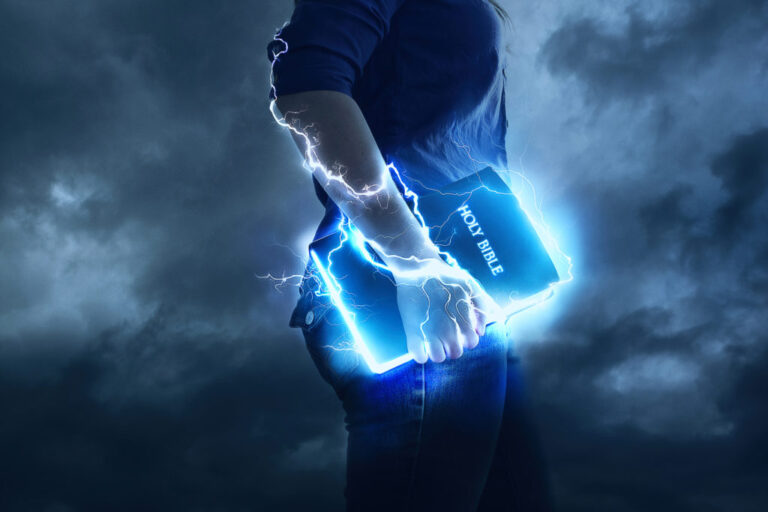
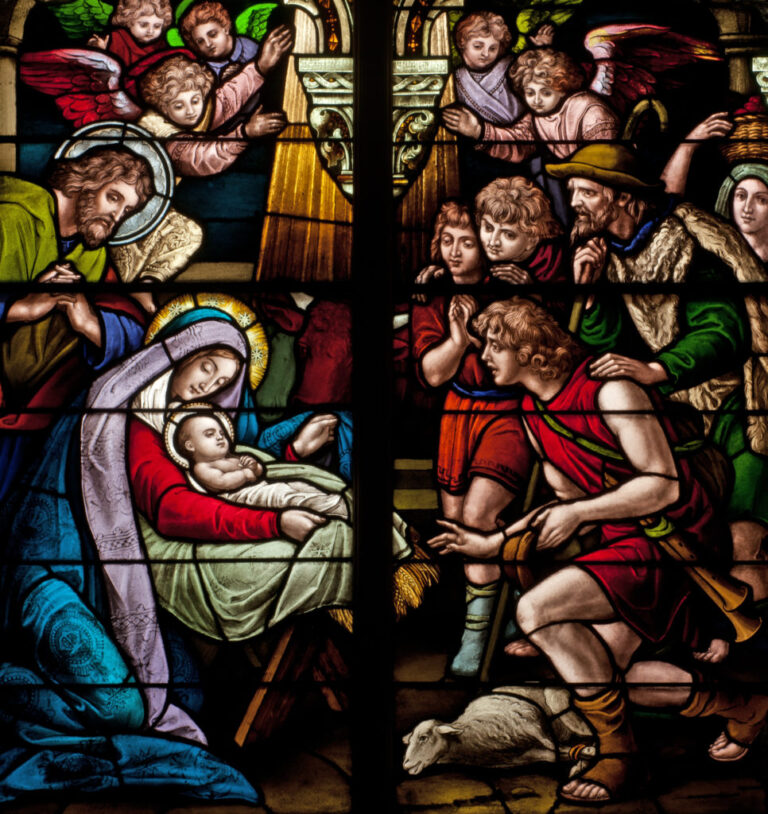

Pingback: Speaking with the Devil | Logically Faithful